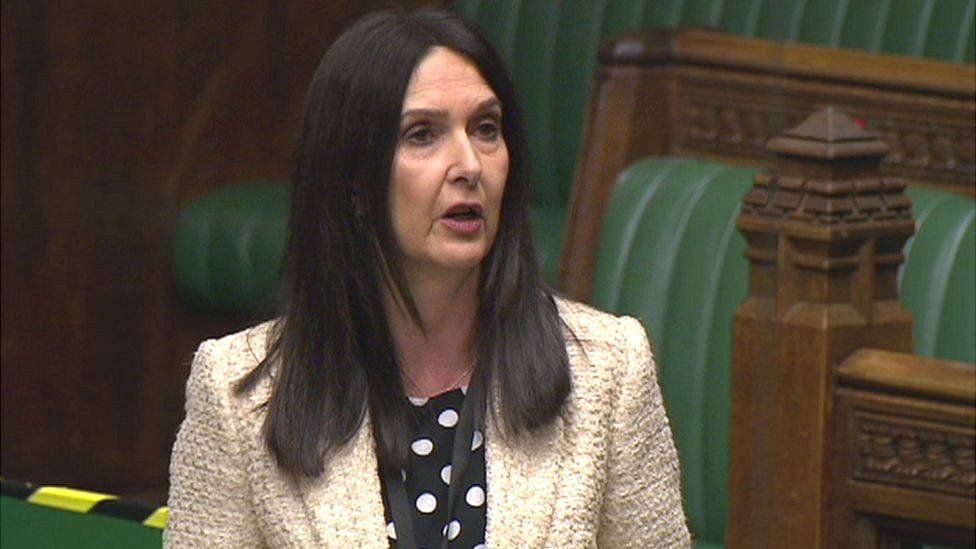
Margaret Ferrier appealed against the proposed ban
A vote on whether to ban MP Margaret Ferrier from the House of Commons for 30 days for breaching Covid rules has been postponed.
MPs were expected to back the move against the Rutherglen and Hamilton MP, which is likely to lead to a by-election in the constituency.
But the vote has now been withdrawn because too few MPs were present in the Commons to guarantee it would be carried.
It will now take place next month.
Ferrier spoke in parliament while awaiting the results of a Covid test in September 2020.
She then took a train home to Glasgow after learning she had tested positive.
The MP was sentenced to 270 hours’ community service last year at Glasgow Sheriff Court after pleading guilty to a charge of culpable and reckless conduct.
The Commons’ standards committee recommended in March that Ms Ferrier should be suspended. On Monday an independent expert panel upheld the original judgement.
The vote on whether to ban her will now take place after Westminster’s Whitsun Recess which ends on 5 June.
It is expected MPs will back the 30-day suspension.
Under Commons rules, if an MP is excluded for 10 days or more a so-called ”recall petition” can take place.
If it is signed by more than 10% of eligible voters in the constituency, the MP is removed from their seat and a by-election called.
The electorate for Rutherglen and Hamilton West in the 2019 general election was 80,918 – therefore just over 8,000 people would have to sign the petition to remove Ms Ferrier.
Ms Ferrier was elected as an SNP MP but lost the whip following her actions and now sits as an independent.
The MP has faced renewed calls to quit the seat which she won with a majority if 5,230.
She has previously said she “deeply regretted” her actions but has so far refused to resign.
Image source, PA Media
Scottish Labour leader Anas Sarwar campaigned in Ms Ferrier’s constituency on Monday
Scottish Labour is confident of winning the seat, with polls suggesting that support for the SNP has fallen in recent months, and has already picked Michael Shanks as its candidate – albeit in controversial circumstances – in anticipation of a by-election.
Party leader Anas Sarwar said he was confident that the threshold for removing Ms Ferrier as an MP would be met and urged her to put her constituents first by resigning now.
Mr Sarwar said people in the constituency were “furious” that the issue had dragged on for so long.
He added: “Every step of the way, this individual is trying to keep her job rather than actually standing up for the community that needs proper support”.
Ms Ferrier’s former colleagues in the SNP – including then-party leader Nicola Sturgeon – have consistently called for her to quit since her Covid breach came to light.
Image source, Getty Images
Margaret Ferrier campaigning with the then-SNP leader Nicola Sturgeon ahead of the 2019 general election
Speaking after she lost her appeal, an SNP spokesman said: “There must now be a by-election in Rutherglen and Hamilton West.
“The SNP is ready to take the fight to the Tories and pro-Brexit Labour Party at that by-election – and we will be putting the cost of living, NHS and independence at the heart of our campaign.”
Meanwhile, Scottish Conservative MSP Graham Simpson said Ms Ferrier’s actions were “reckless” and echoed calls for her to resign.
He said: “Instead, it looks like she will brazenly continue to take her MP salary until the bitter end.”
What did Margaret Ferrier do?
The Commons’ standards committee recommended in March that Ms Ferrier should be suspended, with an independent expert panel upholding the original judgement on Monday after she appealed against it.
The panel concluded that she had acted with “blatant and deliberate dishonest intent” and a “high degree of recklessness to the public and to colleagues and staff at the House of Commons”.
It added: “This is not one momentary error of judgment. It is a sequence of events amounting to a deliberate course of dishonest behaviour.
“She acted selfishly, putting her own interests above the public interest. There could therefore be no lesser sanction for this conduct.”
Ms Ferrier previously said she took a Covid test on Saturday 26 September 2020 because she had a “tickly throat”. While awaiting the result she went to church on the Sunday and gave a reading to the congregation, and later spent more than two hours in a bar in Ayrshire.
She then travelled to London on a train that had 183 passengers on board on the Monday and spoke in the Commons later that day.
Shortly after leaving the chamber, she found out she had tested positive for the virus and took a train back to Glasgow the following day to avoid having to self-isolate in a London hotel room for two weeks.
She did not tell anyone about the positive test result until she was back in Glasgow.
Her appeal against the proposed 30-day suspension said it was too severe and that she was the victim of “double jeopardy” as she had already been punished by a criminal court for her offence.








